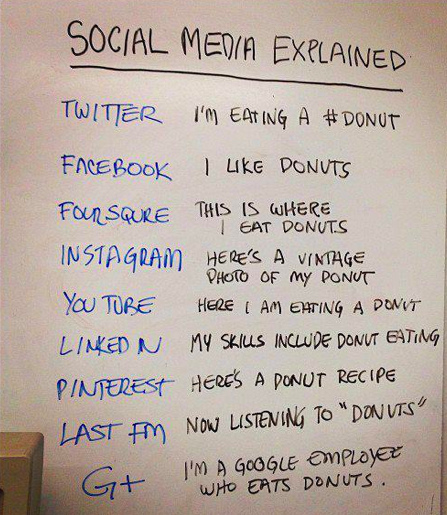Social Media Discovery Increasingly Critical to Effective Claim Resolution
 In the last 10 years, with the explosion of internet speed and accessibility, the average person has developed a large online footprint. Social media has taken off as a way for people to keep in touch, share pictures, and network business. People post a tremendous amount of personal information on sites like Facebook, Twitter, LinkedIn and Google+, much of which is available to the general public. The stats alone tell the degree to which the world population is using social media services:
In the last 10 years, with the explosion of internet speed and accessibility, the average person has developed a large online footprint. Social media has taken off as a way for people to keep in touch, share pictures, and network business. People post a tremendous amount of personal information on sites like Facebook, Twitter, LinkedIn and Google+, much of which is available to the general public. The stats alone tell the degree to which the world population is using social media services:
-
Facebook: 1.28 billion users
-
Twitter: 255 million users
-
LinkedIn: 300 million users
-
Google+: 300 million users
-
Instagram: 200 million users
Pre-litigation social media investigations by insurance adjusters
As an insurance adjuster, it is critical to investigate the social media presence of the claimant and even your own insured at the outset of a claim. Upon receipt of a new claim:
- Search for any publicly available information on social media sites that the claimant has made available at the earliest opportunity. Save to PDF or print what is available.
- Google the opposing party’s name, followed by “twitter,” “facebook,” etc.
- Consider hiring an independent investigator to conduct the investigation. If the case were to go to litigation, the investigator could provide the necessary authentication for the evidence.
While it may seem obvious, do not try and befriend the claimant online in order to gain access to their information. Don’t create an account under a false name to gain access to their information. What is available publicly is generally fair game to investigate.
Obtaining social media records via discovery during litigation
If the claim results in litigation, social media records that are not available publicly may be able to be obtained through the discovery process. Currently, there is limited case law in Illinois regarding the discovery of social media, but it is only a matter of time before the Appellate courts render opinions on what is discoverable as far as social media requests are concerned. Even without explicit guidance, the general rule in Illinois regarding discovery applies: the request must be narrowly tailored to produce relevant information that is reasonably calculated to lead to the discovery of admissible evidence.
Unfortunately, in a civil action, subpoenas to Facebook, Twitter, etc. are likely unenforceable under the Stored Communications Act. However, obtaining the “digital archive” of a specific account is much more beneficial than simply “screen capturing” what is publicly available because the archive will contain a full account history of updates and deletions. Since the information cannot be obtained by civil subpoena, discovery requests will likely need to be issued to the opposing party seeking relevant social media information. Importantly, it is highly unlikely that any judge is going to allow the “any and all” approach to social media discovery requests. Rather, the request should be narrowly tailored so that it seeks only a relevant timeframe of information—two years prior to the accident through the present will likely pass the court’s muster. Specific instructions for how to request the data log for the service provider should be included in the request. For example, for Facebook, the request should read:
[box]You may download and print Facebook data by logging into the Facebook account, selecting “Account Settings” under the “Account” tab on your homepage, clicking the “learn more” link beside the “Download your information” tab, and then following the directions on the “download your information” page.[/box]
For a Twitter account request, these instructions should be included. Additionally, LinkedIn provides a Model Consent form available on its website that plaintiff can sign in order to obtain an archive of the user’s account.
Insureds should never be told to delete potentially damaging information, as deletion could provoke devastating court sanctions
Critically, the client (or the insured) should never be told to delete potentially damaging information! The few cases that have addressed deletions of social media information in the various U.S. Courts show the potential for devastating sanctions in this area:
In Torres v. Lexington Insurance Co., plaintiff claimed severe emotional and mental anguish after allegedly being sexually assaulted at a massage parlor. Despite these claims, defendants learned outside of discovery that Mrs. Torres possessed several web pages depicting an active social life, and an aspiring singing and modeling career. Immediately after disclosing this information, plaintiff deleted these web pages. Plaintiff’s injury claims were barred by the Court.
Similarly, in Lester v. Allied Concrete Co., plaintiff’s counsel instructed his client to delete potentially damaging photographs from his Facebook account after receiving a discovery request for such information. The trial court sanctioned plaintiff’s counsel in the amount of $542,000 and Lester in the amount of $180,000.
Again, many people are surprised that many of the sites on which they post their information with settings of “private,” have no guarantee of privacy, particularly with litigation pending. Objections that this information is “private” or that some “social media privilege” exists are generally unfounded. Both litigators and insurance adjusters can expect social media information to be an increasingly critical tool in investigation of claims and discovery after suit is filed.
Image by Chris Lott licensed under CC BY 2.0
